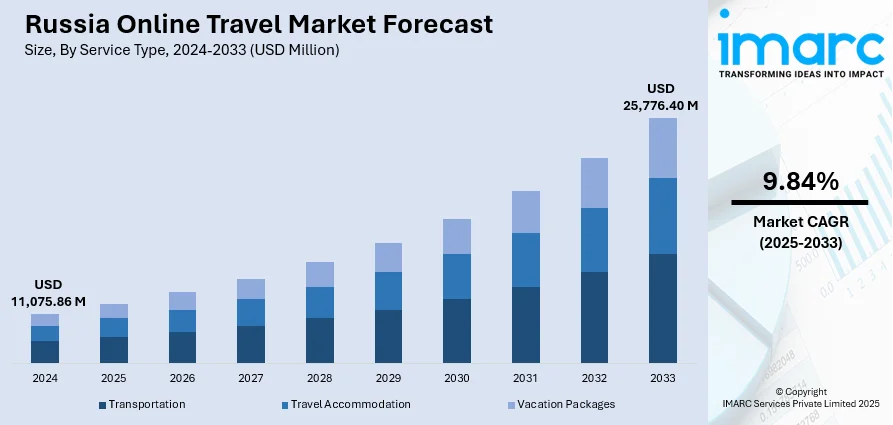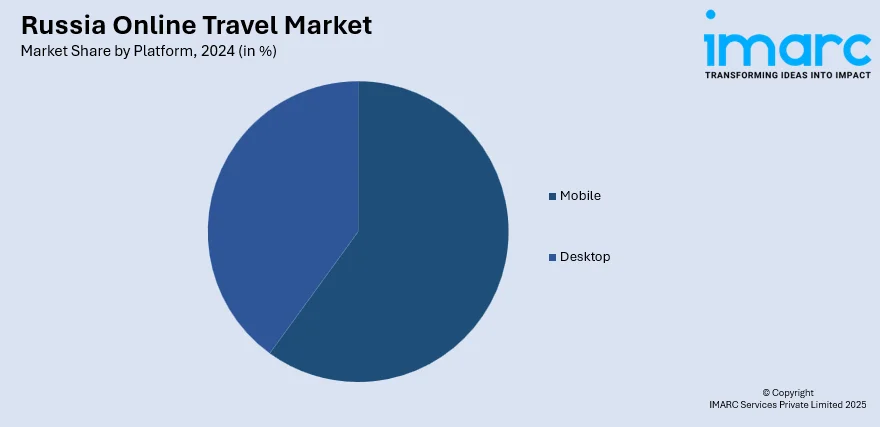
Russia Online Travel Market Size, Share, Trends and Forecast by Service Type, Platform, Mode of Booking, Age Group, and Region, 2025-2033
Russia Online Travel Market Overview:
The Russia online travel market size reached USD 11,075.86 Million in 2024. The market is projected to reach USD 25,776.40 Million by 2033, exhibiting a growth rate (CAGR) of 9.84% during 2025-2033. The online travel market is observing steady growth, driven by increasing digital adoption, rising demand for seamless travel experiences, and the widespread use of mobile and online booking platforms. Consumers are prioritizing convenience, real-time access, and personalized travel options, prompting service providers to innovate and streamline offerings. Both established players and emerging platforms are leveraging technology to enhance user engagement. Continued infrastructure development and regional expansion are expected to further propel the Russia online travel market share.
|
Report Attribute
|
Key Statistics
|
|---|---|
|
Base Year
|
2024 |
|
Forecast Years
|
2025-2033
|
|
Historical Years
|
2019-2024
|
| Market Size in 2024 | USD 11,075.86 Million |
| Market Forecast in 2033 | USD 25,776.40 Million |
| Market Growth Rate 2025-2033 | 9.84% |
Russia Online Travel Market Trends:
Mobile-First Personalization Augmenting Travel Experience
In April 2024, various Russian travel websites launched new mobile-first functionality, mirroring the increasing prominence of mobile usage for travel planning. The features involved voice search, AI-driven trip recommendation, and geo-targeted recommendations based on user behavior. Travelers now want a seamless booking process from discovery to payment all through mobile apps. Platforms are transforming from mere booking platforms into comprehensive digital ecosystems with bundled offerings including transport, accommodation, activities, and even handpicked culinary itineraries. Biometric login, QR payment, and stored preferences make mobile platforms a highly customized user experience that evolves in real time. Travel suppliers are also using AI to suggest destinations according to history, season, and location. This combined experience is especially appealing to younger travelers who prefer to have uninterrupted, app-native interaction. Therefore, online travel platforms are not only responsive but are now also anticipatory. The mobile services' convenience and flexibility are creating a new paradigm for engagement and represent a pivotal point in Russia online travel market growth.

To get more information on this market, Request Sample
Rise in Domestic Regional Tourism Experiences
In February 2024, major Russian travel platforms began promoting new categories for domestic destinations, emphasizing cultural, ecological, and wellness experiences. This shift comes in response to growing traveler interest in exploring lesser-known regions such as Altai, Karelia, and the North Caucasus. Online platforms now feature curated travel packages that combine transport, lodging, guided tours, and local cuisine, designed to offer deeper regional immersion. Filters for “nature escapes,” “eco-retreats,” and “wellness travel” have become standard, helping travelers plan customized experiences beyond urban centers. The emphasis is no longer on convenience alone, but on meaningful discovery and local authenticity. These offerings are often presented with video tours, traveler testimonials, and thematic guides to inspire exploration. Platforms are increasingly collaborating with regional tourism boards to enrich content and ensure logistical support, especially for remote or seasonally accessed areas. This digital expansion of domestic tourism content underscores a broader consumer shift toward experiential travel within the country. Such evolving user behavior is now central to defining Russia online travel market trends.
Inbound Travel Gains Momentum Through Localization
In January 2025, Russian travel platforms introduced expanded multilingual interfaces and multi-currency checkout options aimed at international users. These changes have improved the accessibility of Russia’s tourism offerings, especially for travelers from Asia, the Middle East, and neighboring markets. Booking sites now feature language support in Chinese, Turkish, and Arabic, as well as localized landing pages tailored to cultural preferences. The digital ecosystem has also integrated visa application guidance and embassy contacts, enabling travelers to complete more of the planning process within a single platform. Alongside these technical upgrades, operators are launching targeted marketing campaigns abroad that highlight cultural heritage, nature tourism, and winter experiences. The result is a more intuitive, inclusive, and supportive interface for foreign users, especially first-time visitors. This approach strengthens Russia’s visibility in global search and booking funnels, while encouraging longer stays and broader regional exploration. As the country repositions itself on the international tourism map, platform localization is becoming a key strategic asset, solidifying the future direction of the Russia online travel market.
Russia Online Travel Market Segmentation:
IMARC Group provides an analysis of the key trends in each segment of the market, along with forecasts at the country and regional levels for 2025-2033. Our report has categorized the market based on service type, platform, mode of booking, age group.
Service Type Insights:
- Transportation
- Travel Accommodation
- Vacation Packages
The report has provided a detailed breakup and analysis of the market based on the service type. This includes transportation, travel accommodation, and vacation packages.
Platform Insights:

- Mobile
- Desktop
A detailed breakup and analysis of the market based on the platform have also been provided in the report. This includes mobile and desktop.
Mode of Booking Insights:
- Online Travel Agencies (OTAs)
- Direct Travel Suppliers
The report has provided a detailed breakup and analysis of the market based on the mode of booking. This includes online travel agencies (OTAs) and direct travel suppliers.
Age Group Insights:
- 22-31 Years
- 32-43 Years
- 44-56 Years
- Above 56 Years
A detailed breakup and analysis of the market based on the age group have also been provided in the report. This includes 22-31 years, 32-43 years, 44-56 years, and above 56 years.
Regional Insights:
- Central District
- Volga District
- Urals District
- Northwestern District
- Siberian District
- Others
The report has also provided a comprehensive analysis of all the major regional markets, which include Central District, Volga District, Urals District, Northwestern District, Siberian District, and others.
Competitive Landscape:
The market research report has also provided a comprehensive analysis of the competitive landscape. Competitive analysis such as market structure, key player positioning, top winning strategies, competitive dashboard, and company evaluation quadrant has been covered in the report. Also, detailed profiles of all major companies have been provided.
Russia Online Travel Market News:
- June 2025: S7 Airlines is expanding its domestic network this year to meet growing travel demand. From Moscow, the airline will increase flight frequencies to popular destinations including Sochi, Kaliningrad, and Yakutsk. This expansion aims to enhance accessibility to key vacation spots, supporting Russia's thriving tourism industry. The move reflects S7 Airlines' commitment to providing more travel options and flexibility for passengers during the peak summer season.
- May 2025: Young Pioneer Tours (YPT) has now released its Russia tours for 2025 and 2026, after high demand from tourists willing to visit the nation. YPT has been conducting special travel experiences throughout Russia since 2010, covering areas such as Chechnya, Siberia, and Sakhalin. With less restricted access to visas and renewed emphasis on tourism, YPT will be offering in-depth group tours that explore Russia's impressive history and multicultural heritage.
Russia Online Travel Market Report Coverage:
| Report Features | Details |
|---|---|
| Base Year of the Analysis | 2024 |
| Historical Period | 2019-2024 |
| Forecast Period | 2025-2033 |
| Units | Million USD |
| Scope of the Report |
Exploration of Historical Trends and Market Outlook, Industry Catalysts and Challenges, Segment-Wise Historical and Future Market Assessment:
|
| Service Types Covered | Transportation, Travel Accommodation, Vacation Packages |
| Platforms Covered | Mobile, Desktop |
| Mode of Bookings Covered | Online Travel Agencies (OTAs), Direct Travel Suppliers |
| Age Groups Covered | 22-31 Years, 32-43 Years, 44-56 Years, Above 56 Years |
| Regions Covered | Central District, Volga District, Urals District, Northwestern District, Siberian District, Others |
| Customization Scope | 10% Free Customization |
| Post-Sale Analyst Support | 10-12 Weeks |
| Delivery Format | PDF and Excel through Email (We can also provide the editable version of the report in PPT/Word format on special request) |
Key Questions Answered in This Report:
- How has the Russia online travel market performed so far and how will it perform in the coming years?
- What is the breakup of the Russia online travel market on the basis of service type?
- What is the breakup of the Russia online travel market on the basis of platform?
- What is the breakup of the Russia online travel market on the basis of the mode of booking?
- What is the breakup of the Russia online travel market on the basis of age group?
- What is the breakup of the Russia online travel market on the basis of the region?
- What are the various stages in the value chain of the Russia online travel market?
- What are the key driving factors and challenges in the Russia online travel market?
- What is the structure of the Russia online travel market and who are the key players?
- What is the degree of competition in the Russia online travel market?
Key Benefits for Stakeholders:
- IMARC’s industry report offers a comprehensive quantitative analysis of various market segments, historical and current market trends, market forecasts, and dynamics of the Russia online travel market from 2019-2033.
- The research report provides the latest information on the market drivers, challenges, and opportunities in the Russia online travel market.
- Porter's five forces analysis assists stakeholders in assessing the impact of new entrants, competitive rivalry, supplier power, buyer power, and the threat of substitution. It helps stakeholders to analyze the level of competition within the Russia online travel industry and its attractiveness.
- Competitive landscape allows stakeholders to understand their competitive environment and provides an insight into the current positions of key players in the market
Need more help?
- Speak to our experienced analysts for insights on the current market scenarios.
- Include additional segments and countries to customize the report as per your requirement.
- Gain an unparalleled competitive advantage in your domain by understanding how to utilize the report and positively impacting your operations and revenue.
- For further assistance, please connect with our analysts.
 Request Customization
Request Customization
 Speak to an Analyst
Speak to an Analyst
 Request Brochure
Request Brochure
 Inquire Before Buying
Inquire Before Buying




.webp)




.webp)












